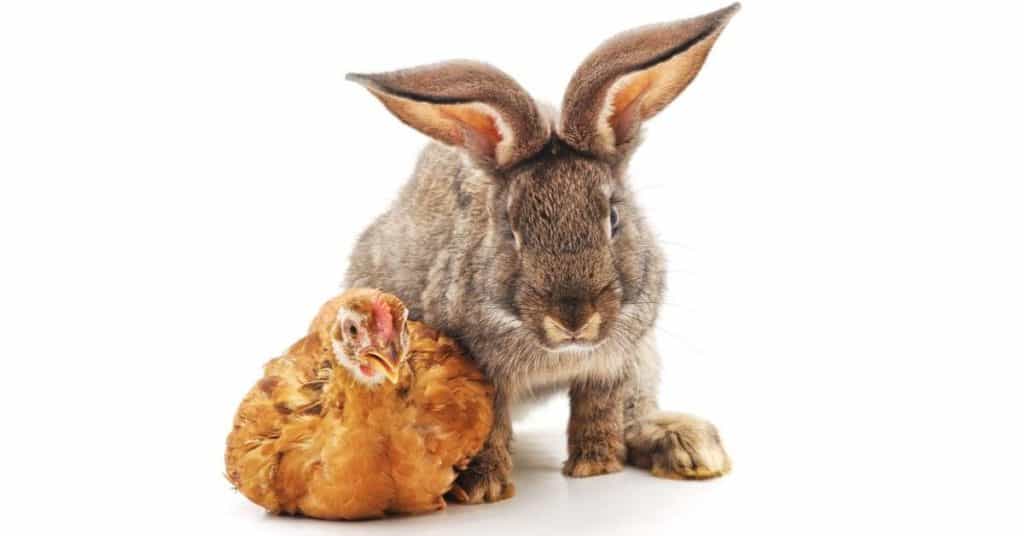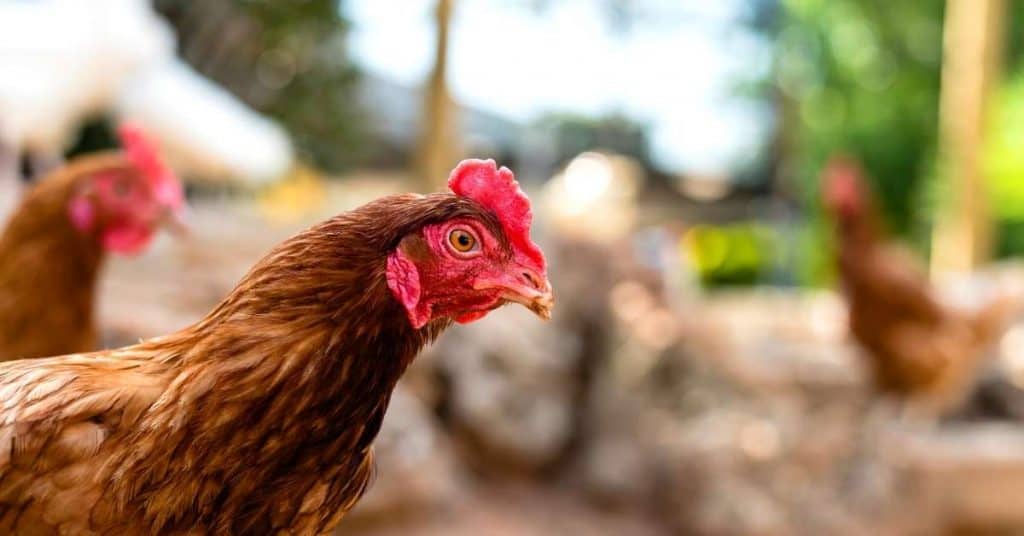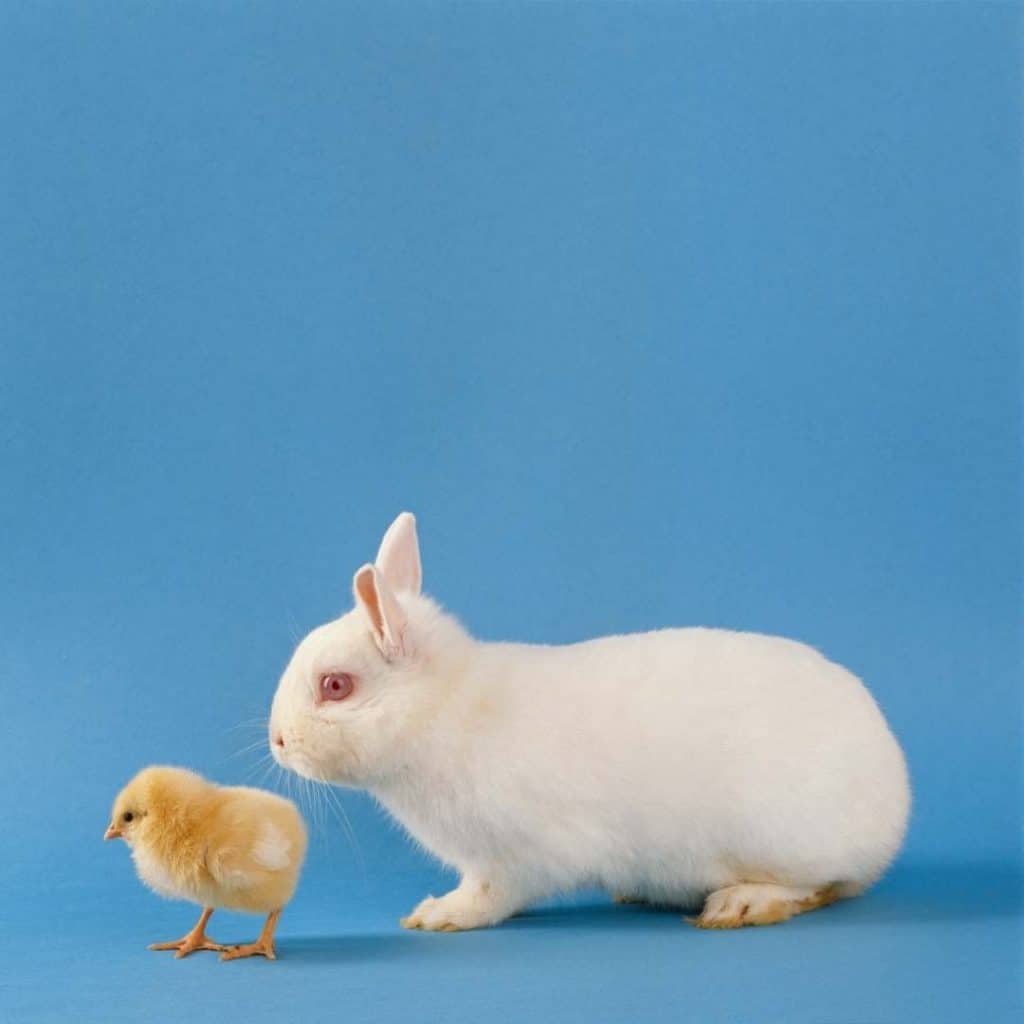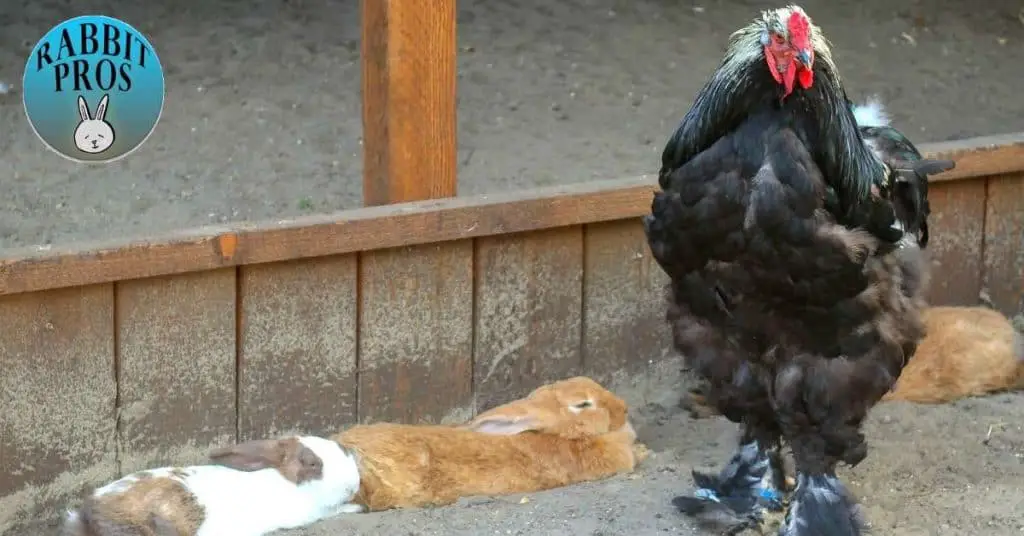Disclosure: We may earn money or products from the companies mentioned in this post.
You’re not the first rabbit lover who also has backyard chickens and you’re not the first to ask yourself “can rabbits and chickens live together”. Heck, years ago I had the same question and since then I’ve actually tried to keeping rabbits and chickens together. Let me share what I’ve found out.
We’ll start with the basic answer and then dig into the details.
Chickens and Rabbits can live together but it takes extra effort on your part. Chicken and Rabbits are different species with different needs, including food requirements and sleeping arrangements. If you plan ahead, you can keep bunnies and chickens together.
This article will help you deal with all your questions about rabbits and chickens sharing the same space. Note that there are times where rabbits and chickens can live together comfortably but there are also moments where the best thing an owner can do for them is separate them temporarily or perhaps even permanently.

The Pros & Cons Of Rabbits & Chickens Living Together
Just like all relationships, there are advantages and disadvantages to living together. This applies even in the animal kingdom.
Rabbits and chickens are two of the most common farm animals, they are also both prey in the wild so it makes sense to ask if it’s a good fit for the thumpers to live with the cluckers.
Knowing the Pros and Cons of putting these two together will help you make a more informed decision.
Pros Of Keeping Rabbits And Chickens Together
1. Space Efficient
Saving space is the most obvious advantage of keeping rabbits and chickens together. Keeping them outdoors in a shared space minimizes the need to have two separate enclosures for these two animals.
This is even more important when you consider that an outdoor home for both chickens and rabbits must be predator-proof. A preditor-proof cage is more expensive and labor-intensive to build, and it requires regular maintenance to remain preditor-proof. Having one outdoor house is half the work of having two.
It is important to know however that other important consideration has to be taken note of when rabbits and chickens are in one enclosure together. We will be discussing them further as we go along but it is important that the rabbit and chicken enclosure must be big enough for all the rabbits and chickens to be comfortable.
Rabbits should still have enough space to play and run around and each animal should still be given privacy from the other.
2. Happier Rabbits And Chickens
When introduced properly chicken and rabbits can cohabitate in peace.
Rabbits and chickens are social animals and they both generally have a well-mannered temperament. They not only learn to tolerate each other but they can also be best of friends.
Social animals tend to fare better with a companion, so having chickens and rabbits together can make for happier animals.
However, it is also important to know that although rabbits can be friends with chickens both species prefer to have a companion of their own species. In this sense, it is then important to take note of the ratio of rabbits and chickens that live in a coop.
As a general rule, it is better to have at least two of each kind living together. It is not ideal to leave a single chicken alone with two rabbits, because rabbits tend to hop and run around which stresses out some chickens.
We sometimes keep our rabbits in rabbit tractors and they get all excited and start binkieing when the free-range chickens come to visit.
3. Better Safety
Chickens and Rabbits are both prey animals therefore, they attract the same kind of predator, but having all of your animals in one location makes them easier to protect.
First, being required to maintain just one housing structure in a predator-proof state is easier than keeping two structures in that good of shape. The old saying goes, “good fences make good neighbors”, but in the case of keeping rabbits and chickens outside it should go, “good fences, roofs, and walls make safe animals”.
P.S. If you want a pre-built outdoor hutch for a few rabbits and few chickens, this outdoor hutch from Omlet is the highest quality one we’ve found. It’s not inexpensive, but it’s designed so well.
But it’s not just the potential for a more secure structure that adds to safety, but there is also increased safety by having more animals together….there is indeed safety in numbers. While chickens and rabbits are going to put up a big fight (though roosters will sometimes give it their best shot to protect their hens), there is some safety in numbers.
With chickens and rabbits scattering every direction, including up, each one has a better chance of escaping as the predator is confused by all of the commotions. At the very least, with the commotion possible by a mixed coop, it’s likely that even if a predator gets in, they’ll leave with just one victim instead of staying to grab a second.
4. Winter Warmth
One of the practical reasons to keep bunnies and chickens together is that during the cold winter months more bodies mean more heat.
We keep both chickens and rabbits outside in the winter, and both are obviously warmer when they have cuddle buddies to keep warm with.
5. Potential For An Endearing Bond
Well, why not? It could be exciting.
Bunnies and chickens who live together sometimes become one of the heartwarming stories we see where unlikely friendships form between different species and they seemingly can’t live without each other.
Although bunnies and chickens are dissimilar biologically, they also have a lot of things in common. Both of these animals have the heart and the intelligence that creates a potential for a strong friendship to form. They only need us, the humans, to understand and create the right environment to foster and make it bloom.

Cons of Rabbits and Chickens living together
1. Cleanliness
Rabbits are generally very clean animals, they can be litter trained and are known to be meticulous when it comes to grooming themselves. In this respect, chickens differ vastly.
Chickens are not the cleanest of all farm animals, they also tend to poop where ever they are standing (or walking) and they poop a lot. Chicken poop isn’t the hard pellets that your bunny drops but is a pretty soft and stinky pile.
If a rabbit walks over chicken poop, they are going to get it in the fur on their paws. If they happen to lay in it or binkie into it, you can have a really dirty rabbit.
Keeping chickens and rabbits together requires constant vigilance to ensure that their homes are clean all of the time. Not only will good cleaning practices keep your rabbit from stinking like chicken poop, but that cleaning can help prevent any diseases from spreading between the two species.
I will have a separate section to discuss the zoonotic diseases that can spread between bunnies and chickens.
2. Differing Temperaments
While chickens are prey animals and aren’t known to be aggressive, they sometimes do get a little pecky as they establish the pecking order (see where that phrase comes from?) in the hen house. This behavior isn’t unknown in rabbits, and sometimes you will see rabbits fight each other to establish their own pecking order, however, it’s more common in chickens.
Chickens and rabbits are individual species and therefore, the temperament of each can be different from another. Rabbits tend to hop a lot while playing, chickens aren’t necessarily fond of fast-moving fluff balls and they might retaliate. There can be instances of pecking, fighting, clawing, and two sets of very stressed-out animals.
3. Digging
You already know that rabbits are diggers. But you might be surprised to learn that chickens are diggers too, they just don’t dig as deep.
Chickens dig shallow holes where they can take dust baths which helps them control not only the oil on the skin but potential mite infestations. Given the choice, rabbits would also take dust baths and when living together they will share the chicken’s dust bath.
However, rabbits won’t just roll in the shallow hole, they’ll feel the need to make it deeper…and deeper…and deeper.
To be clear, a rabbit will dig a hole even if there isn’t a dust bath hole already there, but the presence of that shallow hole will encourage even more digging.
You’ll be filling in rabbit holes regularly.
One alternative to filling in holes is to invest in coop flooring that will keep your rabbit from digging too deep. We’ve done this with wooden slats on rabbit tractors and even thick wire which sits directly on the ground.
The other alternative is to keep your rabbits and chickens off the ground, but we’re not a fan of this living arrangement. Both animals are happier and healthier when they are on the ground and ideal moving around on fresh grass where they can graze and thrive.
4. Food
It is important to understand that chickens and rabbits have different nutritional requirements.
On the simplest level, chickens are designed to primarily eat grains and bugs while rabbits are designed to primarily eat leaves, fruit, and vegetables.
Rabbits have sensitive GI tracts so they can’t eat chicken feed which is made of grains. While chicken feed looks like rabbit feed, it will block up a rabbit’s digestive system.
It is then important to feed your rabbits and your chickens separately and this can be a hassle.
This is another factor that needs to be considered when building your custom hutch/coop. The animals can have a common play area where they can bond and play but they need to also have their own spaces to sleep and eat and have some breathing place from each other.
5. Hormones
I cannot emphasize enough the importance of neutering or spaying rabbits.
Aside from the fact that these will be beneficial to their health in the long run, fixed rabbits can also make their integrations with chickens easier.
Intact (not spayed or neutered) rabbits tend to spray their urine to mark their territories, this means you get a stinky hutch/coop and possibly very stinky chickens as well. Also, hormones might make rabbits more territorial and this could cause chaos as rabbits will bite and chase chickens and chickens might retaliate by pecking and clawing.
Neutering will also help preserve your chickens’ dignity. Some unneutered male rabbits will mount anything insight, yes, including your poor chickens. So for the peace of mind of the chicken population and the hutch community as a whole, we suggest not introducing unneutered rabbits to chicken coops.

How To Raise Chickens And Rabbits Together
Raising rabbits and chickens together might seem like a daunting task but, if done right it is also very rewarding. Nothing gives more sense of accomplishment for an owner than to have this farm community living in harmony with each other. Here I outline how you can foster that coveted rabbit and chicken bond.
Early Introduction
Do not ever rush the process of introducing two or more animals. Integration of even animals in the same species takes time, like dogs getting used to other dogs or cats getting used to another cat in the household.
This is the same with rabbits and chickens, do not expect that because of their gentle personalities that they will live in harmony straight away. Rabbits tend to hop around and Chickens get scared of fast-moving objects.
It is best to introduce both of these animals while they are still young. Introducing both species while they are still young provides enough space and time for both of the species to get used to one another.
When we have introduced rabbits into a chicken coop, we put the rabbits in a separate cage (we use big dog crates like this one on Amazon) inside of the hutch for a few days. This allows the animals to get to know each other through the wires and then once we open the gate the introduction is peaceful.
Protip – Be sure to put a piece of plywood on top of the dog crate so the chickens don’t poop on the rabbits.
Also, remember to never put baby rabbits into a coop full of adult chickens not used to them. They will tend to be more energetic than bigger rabbits and could be constantly pecked at by the adult chickens.
Choose The Right Kind Of House
It is important to provide the right kind of home for your rabbit and chickens. One of the most important factors to consider is the size of their hutch.
Keeping rabbits and chickens together might be more space-efficient but this is not an excuse for cramming all your chickens and rabbits into a space where they can barely move. There should be enough space for the rabbits and the chickens to move around.
Small Chickens who have to need to have 2.5 to 5 square feet per chicken while larger chickens would need 5 to 10 square feet of space per chicken. Rabbits in general should have a hutch that is four times their size. If you are keeping them together, the hutch size is the sum of those requirements.
You should also have separate spaces within the hutch for rabbits and chickens. It’s good for both of them to share the same play area, after all, we’re trying to create a bond between them but like all good relationships, space and privacy is essential for a harmonious cohabitation.
Make sure that rabbits and chickens have their nooks and spaces to sleep away from each other. This is also important especially when it comes to feeding as rabbits should not eat chicken feed and chickens, although they eat anything, should be discouraged from eating bunny food.
Roofs of the rabbit and chicken coop should be waterproof to protect both from getting wet when it rains or snows
Do not let rabbits sleep under chickens and if they do, make sure that it is in an enclosed space with a chicken poop-proof roof. Chickens poop a lot even when they’re sleeping and you don’t want your rabbits to get pooped on as this is gross and might transmit diseases (more on this in a bit).
The enclosure should also be sturdy enough to discourage predators and also avoid escapes as rabbits are quite the master diggers and can create holes for your farm friends to escape from.
There are many things to consider for the perfect rabbit and chicken coop and I suggest going to your trusted farm supplier to create the perfect home that is customized for your needs.
If you want just a few chickens and rabbits, check out the outdoor hutch from Omlet. We think it’s the highest quality outdoor rabbit hutch available and it’s also perfect for chickens. You can learn more about our pick for outdoor rabbit housing in this article.
Numbers Matter
Balance matters when it comes to peaceful living. This can be attained by having balanced temperaments and sturdy homes but the population of the species inhabiting the same space is very important too.
As a rule of thumb, make sure that there are at least two of each kind of animal in a hutch; this means that 2 rabbits and 2 chickens are at a minimum. We don’t suggest putting a single chicken inside a hutch with two rabbits.
Rabbits are fast, they move and jump a lot, chickens are not used to this kind of behavior. It is hard to bond two species when one is outnumbered.
Avoid Hormones
Temperaments are a factor for successful cohabitation between rabbits and chickens but so are hormones.
I don’t think your chickens will appreciate being humped all the time by bucks with raging hormones and you also won’t enjoy it if your rabbit keeps on spraying urine and marking its territory over the common area of the hutch.
Hormones can also tend to lead to aggressive behavior, rabbits can nip and they will bite if you get too close to their territory. Neutering or spaying your rabbits greatly reduces the stress that their hormones will bring to both you and your chickens.
Keep It Clean
The old saying tells us that “Cleanliness is next to godliness” and is a solid rule for both humans and animals.
Good and proper sanitation is key to avoid the spread of unwanted diseases. Although rabbits are very clean animals they do poop a lot and chickens are not the most sanitary and they also poop a lot.
Animal feces contain bacteria that can be harmful to other species so chicken and rabbit living spaces must be cleaned regularly. Also, a clean living space minimizes the risk of chickens and rabbits sharing and passing parasites to each other. I will be going into this further in the next section of this article.

FAQ Rabbits And Chickens Living Together
Can Rabbits And Chickens Eat The Same Food?
You know how the saying goes “sharing is caring” but that does not apply to rabbit and chicken food.
Rabbits cannot eat the same food as chickens. Chicken feed has added calcium and protein which is not required in a healthy rabbit diet and can even cause severe Gastrointestinal Tract (GI Tract) issues that could be fatal to a rabbit.
Under no circumstances should you allow your rabbits to eat chicken feed regularly. It is essential that you separate their feeding areas.
Know that chickens are omnivores and their natural diet is vastly different from the rabbit.
Rabbits are also known to have a very sensitive GI tract so feeding them something that is not aligned to their biological needs can be unhealthy and ultimately fatal.
Problems Caused By Rabbits Eating Chicken Feed
GI Tract Issues
Chicken feed has added protein and calcium, which are not natural to a rabbit’s diet.
Too much protein or calcium will not be digested properly and can lead to intestinal blockage which can be fatal to rabbits because their digestive tract is a one-way system. If you are not familiar with a rabbit’s digestive system, I suggest you take a few minutes to read this article about why rabbits can’t vomit.
If you notice that your rabbit’s bathroom habits have drastically changed then it’s time to see a veterinarian to check that everything is moving as it should.
Rabbits have very sensitive tummies that is why it is recommended to feed them a high-quality diet designed to help your rabbit live a long and healthy life.
If your bunnies eat the incorrect type of food then they will have an imbalance of gut bacteria that will greatly affect their health.
Obesity
Rabbits thrive best on high fiber diets, something that chicken feeds do not have. Chicken feed is known for its high calories and high calories lead to obesity in rabbits.
Although obesity won’t immediately be fatal to your rabbits this will ultimately lower their quality of life as obesity might lead to joint pain, muscle weakness, and breathing issues.
Obesity can also lead to Hepatic Lipidosis. Hepatic Lipidosis happens when there is an excess of fat in the liver.
Signs of Hepatic Lipidosis includes:
- Loss in appetite
- Weakness or lethargy
- Small pellets when defecating
- Trouble defecating
- Skin/coat problems
Kidney Stones And Other Types Of Stone
Chickens need calcium for the eggs that they produce. Without calcium, their eggs would have soft shells and their chicks won’t be able to survive.
Rabbits do not lay eggs and therefore have no need for calcium in their diets.
Excessive intake of high calcium chicken pellets will lead to the growth of calcium stones in their bladder, kidney, and urethra.
Sometimes rabbits will be able to pass these stones with some discomfort but no major problems but there are times wherein the stones would be big enough to cause severe pain and for this scenario, surgery is the only option.
Symptoms of stones in rabbits or Urolithiasis include the following:
- Bloody urine
- Stones in the litter box
- Weak rabbit
- Loss of appetite
- Urine sludge – sludge is characterized by urine with a gritty consistency.
Chickens To Eating Rabbit Poop
Chicken can eat rabbit poop and they will find nutritional value in that poop. Rabbits are herbivores and their poop doesn’t present a danger to chickens.
Although rabbit poop won’t kill your chickens, rabbit poop is not a good substitute for treats or chicken feeds.
Also, it is important to err at the side of caution, animal fecal matter can transmit worms and other parasites. Since outdoor rabbits are more susceptible to these kinds of parasites, fecal matter ingested by the chickens could help spread parasites to other animals.
Can Rabbits & Chickens Make Each Other Sick?
Rabbits and chickens can make each other sick, though it’s not common. Rabbits can pass coccidia and Pasteurella (snuffles) to chickens, and chickens can pass salmonella to rabbits. It’s worth noting that all of these conditions can be passed within species as well. All these conditions can be easily treated.
One of the reasons why cleanliness is very important when keeping rabbits and chickens in one living space is the possibility of spreading diseases. Although these diseases are easily treatable, you should know that some of these diseases can also be passed to humans, which can also easily be treated.
Coccidia
Coccidia is a disease caused by protozoa. 12 species of these protozoans are known to infect rabbits and it is usually known that an infected rabbit can host more than one species at a time.
This disease is usually passed on through feces therefore a chicken eating rabbit feces that are infected will most likely be infected with the same parasite. These parasites attack the intestines of their host and create infectious cysts. Signs of a Coccidia infection include:
- Lack of appetite
- Lethargy or weakness
- Diarrhea
- Blood or mucus in the feces
If you see signs of Coccidia, you should immediately consult with your veterinarian.
Pasteurella
Pasteurella or snuffles is one of the most common respiratory diseases for rabbits. Almost ten percent of rabbits can be infected with this disease.
Common symptoms of rabbit snuffles include nasal discharge, head tilts, and soreness on the skin.
Pasteurella can be transferred to other animals, including humans, through contact with infected animals. When passed on to chickens, this can cause cholera and bloody stools.
Once again, if you see bloody stools, you should consult with your veterinarian or perhaps talk to the experts at your local farm supply store.
Salmonella
Salmonella is an infection that can be passed from animals to humans.
Salmonella is most commonly found in chickens through ingestion of mouse droppings in food and water. An infected chicken will pass this down to its chicks.
Although rabbits are rare carriers of the disease, once infected this can be fatal, just as it can be fatal to humans, though it usually is not.
The salmonella bacteria is most commonly found in infected animal’s stools and are passed on to humans when they get in contact with an infected animal’s feces.
Some animals appear healthy even though they are infected with salmonella; however, some of them may also show symptoms such as bloody stools.
Will Chickens Attack Rabbits?
Chickens can attack rabbits, though it’s not usually a violent attack designed to cause real harm. Chickens peck or flog each other with their wings to establish dominance (the pecking order). They sometimes exhibit this same behavior with other animals, including rabbits.
On a darker note, there is a common misconception that chickens are herbivores. This is not the truth, chickens are omnivores.
Chickens will eat baby mice and even newborn rabbits if they find them. If you keep rabbits with chickens, make sure that pregnant does are kept alone when they are about ready to give birth.
Will Rabbits Hurt Chickens?
Rabbits can hurt chickens. Rabbits have sharp claws and they can deliver a kick if they’re fighting. Although rabbits won’t prey on chicks or chickens some of them especially those that are not neutered will feel very territorial. A rabbit that feels that a chicken has encroached into its territory will most likely nip or bite the perceived intruder.
____________________

I hope that this article has given you the information you need to successfully integrate your rabbits and chickens into one living space. If you have any other tips and watch-outs you’d like to share our comment boxes are open!
~Stacey
